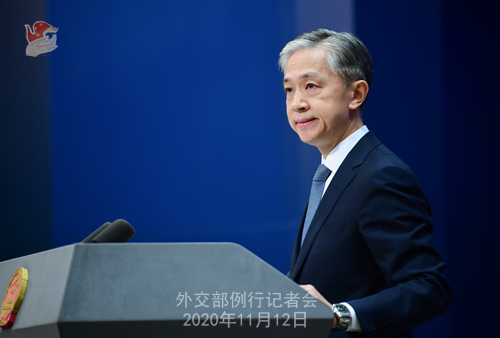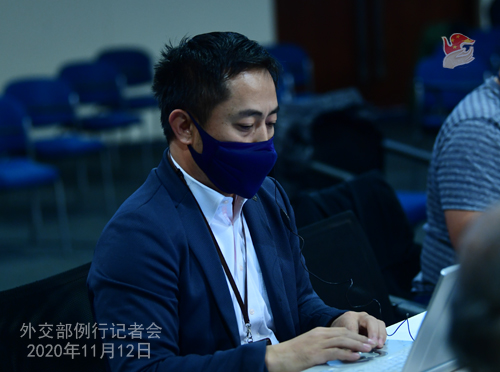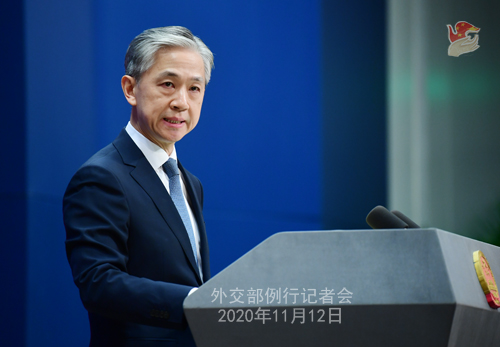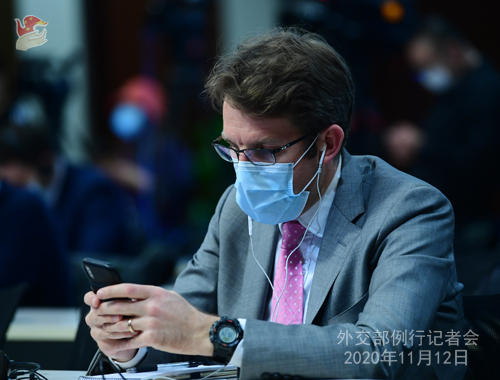| Foreign Ministry Spokesperson Wang Wenbin's Regular Press Conference on November 12, 2020 |
| 2020-11-12 21:43 |
|
CCTV: We now know that President Xi Jinping will attend the 12th BRICS Summit, the 27th APEC Economic Leaders' Meeting and the 15th G20 Summit. Can you talk about China's expectations for these three summits? Wang Wenbin: At present, the ravaging COVID-19 has put the lives and health of people all over the world at great risk and the world economy falling into deep recession. Unilateralism, protectionism and bullying practices are on the rise, and economic globalization is facing headwinds, which aggravates the risks and uncertainties in the world economy. Those unprecedented challenges accentuate the importance of the upcoming the 12th BRICS Summit, the 27th APEC Economic Leaders' Meeting and the 15th G20 Summit. BRICS countries are emerging markets and developing countries commanding global influence. APEC is an important economic cooperation mechanism in the Asia-Pacific region, and G20 is the main forum for international economic cooperation and an important platform to respond to global crises and improve global economic governance. Under the current situation, the convening of the three summits will play an important leading role in strengthening global cooperation against the pandemic, promoting world economic recovery, improving global economic governance, and enhancing regional economic cooperation. China is a staunch supporter, active participant and important contributor to the BRICS, APEC and G20 cooperation. President Xi Jinping's participation reflects the great significance China attaches to the three summits and global economic governance. During the three summits, President Xi Jinping will elaborate on China's proposals and initiatives on strengthening cooperation in his speeches. China is willing to work with all parties to ensure the success of these meetings. AFP: The U.S. has recently warned of further sanctions against China after four Hong Kong opposition lawmakers were disqualified yesterday. Other countries including the UK and Germany have also criticized the disqualification of these lawmakers. What's China's response? Wang Wenbin: You mentioned a handful of countries who criticized the relevant decision made by the NPC Standing Committee. I want to tell you that first, they have no right to make such criticism; second, their criticism makes no sense;and third, their criticism has no audience. Hong Kong is a Special Administrative Region of China. The issue of the qualification of the HKSAR LegCo members is purely an internal affair of China, and other countries have no right to make irresponsible remarks and interfere. This decision made by the Standing Committee of the National People's Congress of China is a necessary and essential step to uphold and improve the "one country, two systems", implement the Basic Law and the Hong Kong national security law, and maintain the rule of law and constitutional order in the HKSAR. It conforms to the fundamental interests of all the Chinese people including the HKSAR compatriots, and is conducive to safeguarding national sovereignty, security and development interests and the long-term stability and prosperity of the HKSAR. We firmly support the HKSAR government in performing its duties in accordance with law based on the decision of the NPC Standing Committee. Civil servants pledging allegiance is a common practice adopted worldwide. In the United States, members of Congress must pledge their allegiance to the Constitution of the United States; in Britain, anyone who refuses to serve the Queen will not be able to serve as a member of Parliament. As the HKSAR LegCo members are also civil servants, they must, of course, declare their allegiance to uphold the Basic Law and serve the HKSAR. No country will turn a blind eye to violations of oath and betrayals by government officials, including lawmakers. The unjustified accusations made by some western politicians against China have fully exposed their double standards. We urge those people to abide by international law and the basic norms of international relations and to stop interfering in China's internal affairs, including Hong Kong affairs. China will not succumb to pressure. No attempt to undermine China's sovereignty, security, and development interests will succeed.
Nippon TV: Japanese Prime Minster Yoshihide Suga had a phone call with Biden this morning, during which they mentioned that Article Five of the US-Japan security treaty is applicable to Diaoyu Dao. Do you have any comment? Wang Wenbin: Diaoyu Dao and its affiliated islands are China's inherent territory. The Treaty of Mutual Cooperation and Security between the United States and Japan, as a product of the Cold War, should not undermine the interests of any third party, still less jeopardize regional peace and stability. Shenzhen TV: US Secretary of State Pompeo delivered a speech at the Ronald Reagan Institute on November 10 and continued with his attack on China and the Communist Party of China. What is China's comment on this? Wang Wenbin: Pompeo has been using his endless political lies to smear and attack China, so typical of a self-serving politician with ideological prejudice hard-wired into his brain. With regard to Pompeo's lies and fabrications, China has repeatedly stated its stern position. I would like to stress that history is always on the side of the fair and just, and all words and deeds that incite confrontation, division and regression to the Cold War era will be absolutely rejected. Lying, cheating and slandering will never stand a chance of stopping the wheel of the history. Pompeo and his likes will go down in history with reputation shattered and credibility smashed to pieces. Yonhap News: China has reportedly suspended Samsung's chartered flight to China. What is China's consideration for this decision? Will that affect the fast-track operation between China and the ROK? Wang Wenbin: I'm not aware of the situation and you may check it with the competent authority. I can assure you that China and the ROK have all along maintained unimpeded communication and coordination on fighting the virus.
Reuters: Australia's Victoria state said China has banned the import of Australian timber after they found pests in Australian timber. Some in Australia have speculated that it is no coincidence that China found pests in Australian timber imports at this particular moment of deteriorating relations with China and China's restrictions on imports from Australia. What is China's comment? Wang Wenbin: After detecting pests in Australian timber, relevant Chinese authorities have suspended timber import from Queensland since October 31, 2020. But recently, Chinese customs found pests from timber imported from the state of Victoria. These pests, once introduced, will pose a serious threat to China's agriculture and forestry as well as ecological security. In order to stem risk at the source and in accordance with relevant Chinese laws and regulations and international standards, the General Administration of Customs of China (GACC) has decided to suspend the import of timber from the state of Victoria from November 11, 2020. The GACC has informed the competent authorities of the Australian side of the above situation and required the Australian side to improve the plant quarantine management system for timber exported to China. The measures taken by the GACC are normal bio-security precautions, which are science-based and reasonable and in line with relevant Chinese laws and regulations and international practices. I also want to tell you that the relevant measures taken by the competent Chinese authorities against products exported to China are in line with Chinese laws and regulations and international practices. They are what must be done to protect China's domestic industries and consumers. At the same time, I would like to stress once again that a healthy and stable China-Australia relationship serves the fundamental interests of the two peoples. Mutual respect is the basis and guarantee for practical cooperation among countries. We hope that the Australian side will match its words with deeds, do more to enhance mutual trust and cooperation, and follow the spirit of the China-Australia comprehensive strategic partnership so as to create favorable conditions and atmosphere for practical cooperation between the two sides. Bloomberg: Further to your answer about Australia. You said that Australia should do more to improve relations with China and the relationship should be based on mutual respect. What are the actions you are looking for from Australia that are necessary to improve relations? Wang Wenbin: China's position on developing China-Australia relations is consistent and clear. The reason why China-Australia relations are in a difficult situation is very obvious. Over a period of time, the Australian side has repeatedly spoken and acted out of turn on issues concerning China's core interests like Hong Kong, Xinjiang and Taiwan and grossly interfered in China's internal affairs in blatant violation of the basic norms governing international relations, In the absence of any evidence, some people in Australia slandered and accused China of engaging in so-called "intervention and infiltration activities" in Australia, and they sought to politicize, stigmatize and create barriers for normal exchanges and cooperation between China and Australia. These practices have seriously damaged the mutual trust between the two countries, poisoned the atmosphere of bilateral relations, and clipped the developing momentum of China-Australia relations. As the saying goes, "the one who tied the knot should be the one to undo it." In order to get out of the predicament, the key lies in Australia facing squarely the crux of the current setback, looking at China and China's development objectively and rationally, handling bilateral relations in accordance with the principles of mutual respect and equal treatment, and doing more things conducive to enhancing mutual trust and promoting practical cooperation between the two countries.
CCTV: According to reports, Brazil's National Health Surveillance Agency (Anvisa) released a statement on November 11 announcing that after evaluating the data provided by Butantan Institute, it believes that there are sufficient reasons to authorize the resumption of Sinovac's clinical trials on the same day. Does China have a comment? Wang Wenbin: We have taken note of the statement from the Brazilian authority as well as Sinovac's response. We are glad to see the resumption of phase III clinical trials of the COVID-19 vaccine. In the process of vaccine research and development, the Chinese side attaches paramount importance to safety and efficacy and strictly complies with international standards and relevant laws and regulations. Chinese companies have been sparing no efforts in advancing vaccine R&D in strict accordance with scientific laws and regulatory requirements. Four Chinese vaccines are in phase III clinical trials in multiple countries, indicating preliminarily a good safety profile. China's vaccine R&D progress has been commended by many countries. China and Brazil have conducted good cooperation in fighting COVID-19. We are confident that relevant cooperation will contribute to vanquishing the virus in China, Brazil and the rest of the world. |
| |||||||||||||||
|
|||||||||||||||





